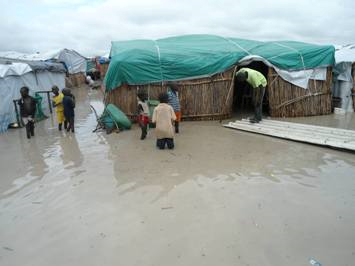490,000 children affected by floods in South Sudan: UNICEF
October 26, 2019 (JUBA) – An estimated 490,000 children are affected by heavy flooding in South Sudan, UNICEF warned Friday.

It said while heavy rain and flooding is normal this time of year, the current scope and scale of the flooding is severe especially in the former Jonglei, Upper Nile, Warrap and Northern Bahr El Ghazal states.
The rain, UNICEF said, is expected to continue for four to six weeks.
In flood-affected areas, several health centres are filled with water and are not able to provide services to the population. Of those remaining open, some are inaccessible to children and their families due to impassable roads and destroyed bridges.
Access to health care in South Sudan was limited before the floods, with the access constraints and upsurge of malaria and diarrhea in the affected areas, the situation is critical.
“In South Sudan, water is normally associated with life, now, water it is putting children’s lives at risk,” said Dr Mohamed Ag Ayoya, UNICEF Representative in South Sudan.
“UNICEF is extremely concerned about children’s health in the affected areas with an increase in malaria and waterborne diseases such as diarrhea, two of the major child killers in South Sudan,” he added.
The floods have reportedly contaminated water sources and 70,000 families are temporarily displaced as their homes are underwater. Schools are closed after succumbing to a large amount of water and classrooms are used as shelters for displaced, leaving children out of school.
The consequences of the floods will be felt long after the water subsides if timely assistance is not given. Damaged crops and grazing land submerged in water will hamper access to food for many children and their families.
This is worsening the already serious food situation in the country, hitting children the hardest. Schools will need to be rebuilt and re-enrollment campaigns executed in order for children to return to classrooms.
“Flood is a harmful cocktail for children,” said Ayoya.
“It increases the risk of exploitation and abuse; it affects their health and education and can also take their lives if we don’t respond timely. UNICEF is calling on donors to ensure the response to children and their families in the flood-affected areas is prompt and adequate,” he added.
UNICEF said it is working with South Sudan government and partners to respond to the floods by conducting field missions, assessing the situation on the ground as it evolves and to determine the best way to respond by, among others, distributing water purification tablets and thousands of hygiene kits to prevent waterborne diseases.
Meanwhile, the UN agency is appealing for $5.5 million to respond to the most immediate needs of children in the flood-affected areas.
(ST)
